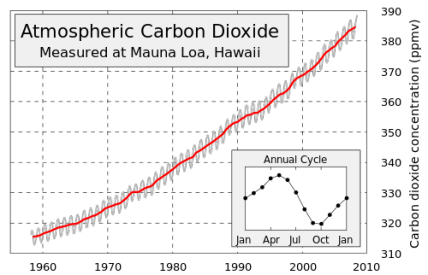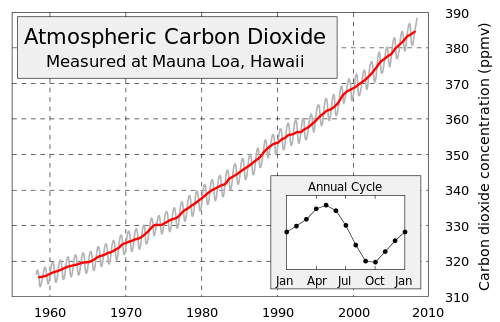
The Keeling Curve. Image courtesy of Wikimedia/Commons
Want to follow something depressing on Twitter? Try the@Keeling_Curve.
For all Chris Mims declared “The end of the world gets a Twitter account”, it’s not, at first, obviously all that exciting. It just tells you how many parts per million CO2 there is in our atmosphere, and that’s only when there’s a reading available. Their avatar’s a graph. An iconic graph, granted, but a graph nonetheless. And honestly, probably only really iconic to a few climate nerds.
Yeah, not really selling it. I know. But there’s something distressingly compelling about this humble little account when you know the background.
This “Keeling Curve” is the world’s longest unbroken record of atmospheric carbon dioxide concentrations. It’s recorded at the Mauna Loa Observatory, Hawaii, and kept by the Scripps Institution of Oceanography, UC San Diego. A scientist called Charles D. Keeling began measurements in 1958. That’s where the “Keeling” bit comes in, and it’s curved because back in 1958, it was 317 parts per million and now we’re scooting up ever-closer to 400. Back at the end of the 18th century, when the Industrial Revolution was just kicking off, CO2 concentration was probably about 280ppm. If you want to see the last time atmospheric CO2 was over 400 ppm you’d have to go back something like 3-5 million years.
We’d already identified 350ppm as an important milestone, it’s why Bill McKibben’s campaign group’s called 350.org. Now, in the words of Ralph Keeling (son of Charles D, nice layer to the story): “I wish it weren’t true, but it looks like the world is going to blow through the 400ppm level without losing a beat”.
Follow these graphs, even if it makes you feel slightly sick. Lose that beat. Follow the Scripps Oceanographers and their website. Be thankful we invest in generations of painstaking science so we can see more than just what’s immediately obvious when we look out the window, keep and eye on cuts to research like this and demand more people pay attention.
(ht RTCC, who have a good piece on this)




